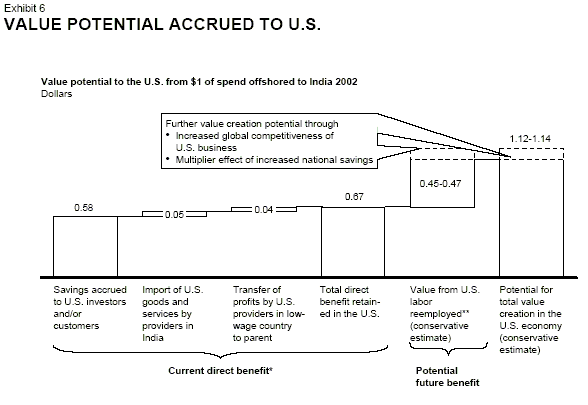September 16, 2003
Offshoring and outsourcing
Had an interesting conversation with my friend MA [I'll use initials unless people tell me otherwise...] the other night about the state of the economy. He's a hedge fund manager, so he's fairly in tune with this stuff. We talked a bit about the recent jobless productivity gains and the new figures projecting 4% plus annualized growth for the third quarter.
MA thinks that this growth will be jobless for the forseeable future, since most of the productivity gains are due to outsourcing, offshoring and other structural employment changes. He's convinced that once the jobs go away, they won't come back.
MA painted a pretty bleak picture, arguing that unlike the offshoring of manufacturing jobs, the move of service jobs will happen extremely quickly, overwhelming even the legendary resilience of the US economy.
Dan Drezner points to The Institute for International Economics recent indication that they think there's some good news ahead, including "substantial numbers of new US jobs in the fourth quarter of this year."
Forbes is also reporting that of 16,000 employers surveyed, 22% said they plan to increase their workforce in Q4.
But back to the larger issue....
Yesterday, I saw this article in CIO Magazine about the backlash against, and twice-thinking going on about, outsourcing IT services. I think it's part of the larger phenomenon that it's harder than people think (for educational, cultural, geographic, etc. reasons) to replace an American with a foreign worker. Certainly, manufacturing jobs didn't leave as quickly as free-trade opponents said they would for many of the same reasons (though they've sense picked up speed, I think).
But, in the seventies and eighties no one expected a huge, booming service economy to replace fleeing manufacturing jobs. Are we in store for another surprise structural shift, or has our luck run out?
McKinsey Global Institute is relatively bullish in their report: Offshoring: Is it a Win-Win Game?. They calculate that for offshoring $1.00 of US labor costs, $1.45 of value is created globally with $1.12 accruing to the US and $0.33 to the foreign country (India in their example). And they have patented McKinsey waterfall charts to prove it....

So those with capital can still capture the cost reductions/productivity gains from outsourcing...but what about the political impact of having so many unemployed people?
Posted by: Michael Weiksner at September 18, 2003 03:28 PMIt's probably a short-term/long-term question. The jobs will reappear in the long term because of increased demand (the old lump of labour fallacy) and the ability to reinvest the return on the offshoring. An example of this is the dotted area on the chart that shows increased competitiveness in the global marketplace. That should translate into more jobs in addition to better capital returns. Jobs will "just appear".
But you're right, there will be a political (and human) fallout because of the time it takes for the new opportunities to ramp up. Plus, they'll mostly likely be in different areas of the economy, requiring retraining, etc. That's why unemployment insurance and job training programs are so important -- it's in everyone interests (the politician, the worker, the business owner who hopes to sell to the workers) to smooth the transition as much as possible.
I believe MGI had a recommended unemployment insurance plan in the report that was based on median time-back-to-work (to try to avoid moral hazard effects). Other options include rewarding people for getting back to work sooner (back-to-work bonuses so to speak). But all of this still doesn't take into account local, geographic effects (like small towns losing their only source of jobs), which is a real problem.
That's why MA's argument is interesting. The loss of manufacturing jobs didn't end up hurting the economy too much because it was spread out over enough time to enable the shift to a service economy. If, as he predicts, the IT/service outsourcing move is much, much quicker, you're right, the political consequences could be huge.
I only hope it doesn't lead to a protectionist backlash.....
Posted by: richard at September 18, 2003 06:22 PMTaking a quick break from agonizing over the money I've lost shorting stocks lately.
So here's how I see it:
The U.S. economy is fighting two monster trends right now. The first is the globalization of the services economy and the second is a massive labor supply shock.
I'm not sure which is more threatening... millions of Chinese working for peanuts in sprawling manufacturing centers or hundreds of thousands of english speaking Indians working the phones and coding the code in Banglador. They both make me think that the United States (and most of the western world - except for Canada) are horribly equipped for the rapidly shifting labor supply curves.
It really boils down to what a unit of labor is worth. I think that rapid technological advances and supply shocks from abroad will significantly reduce the value of human labor.
I would normally sing the praises of productivity, but the leveraged U.S. economy can't withstand a sudden shift in the perceived value of labor.
Plain and simple, how does a guy working in a factory in the mid-west (or in H/R of some utility) with a mortgage and no savings (forget about pension plan) earnign $80,000/year compete against a chinese worker pursuing the Chinese Dream.
Posted by: marc andersen at September 18, 2003 10:22 PM




